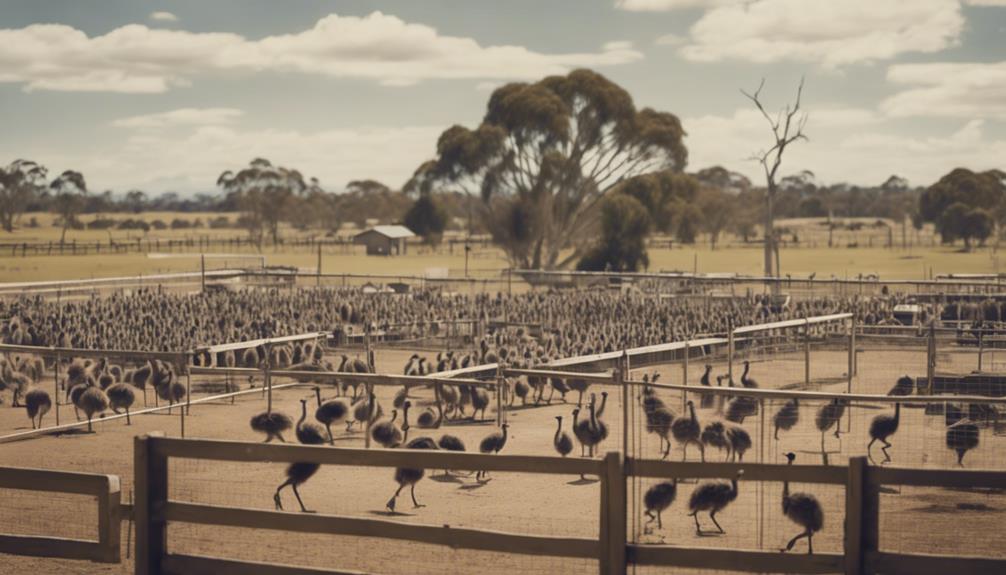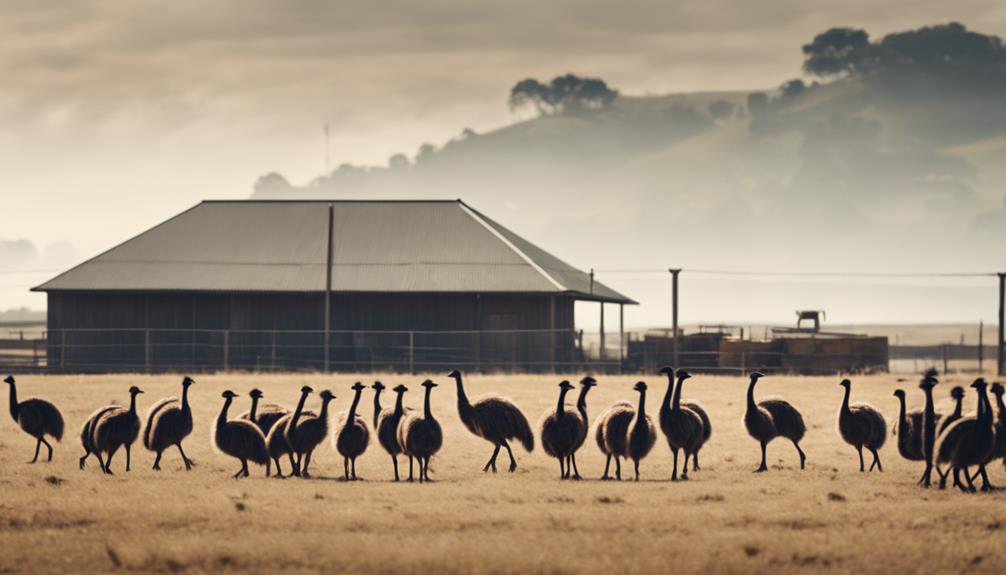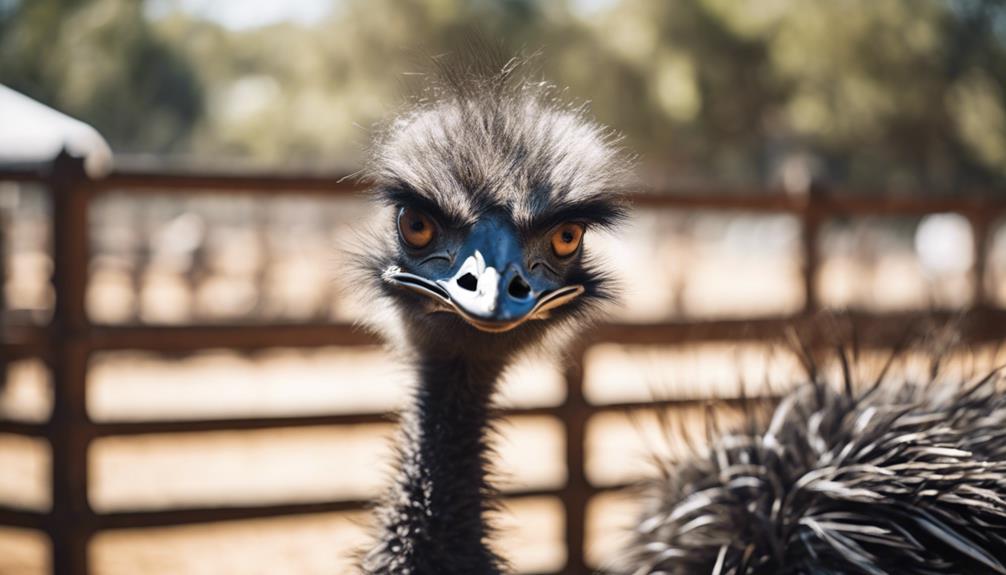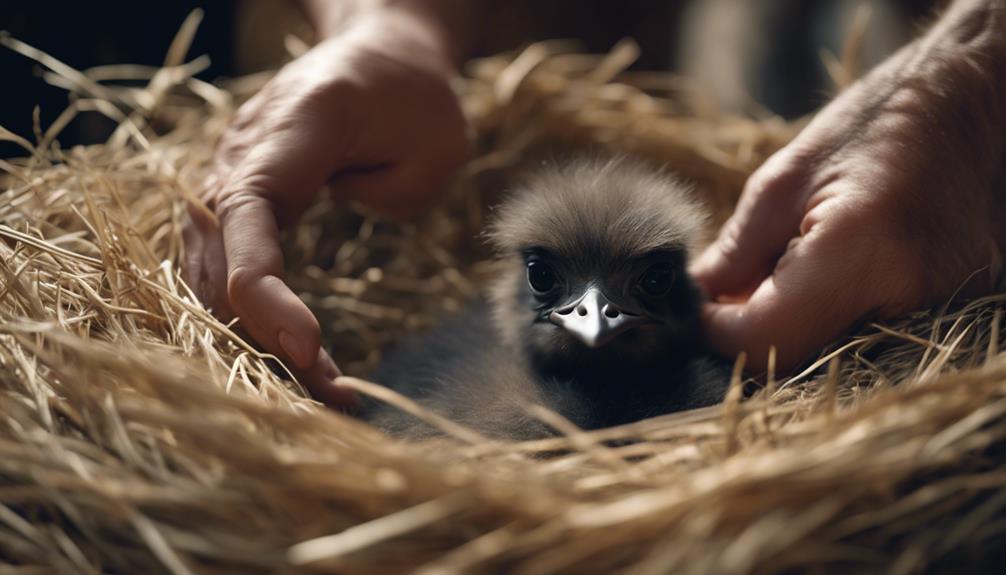
If you're considering starting with emu farming, understanding the basics is crucial. Raising emus for various products can be a rewarding venture, but it requires careful planning and knowledge. From providing the right diet to creating suitable living conditions, there's much to consider for a successful start. However, once you grasp the essentials and implement proper practices, the possibilities in the world of emu farming are vast. Get ready to embark on a journey filled with unique challenges and ultimately, fulfillment in this intriguing industry.
Key Takeaways
- Start with adequate space and proper care for emus.
- Understand emu behavior and nutritional needs.
- Provide suitable shelter, enclosures, and incubation conditions.
- Focus on chick care, feeding, and hygiene.
- Learn about marketing, financial planning, and regulations for successful emu farming.
Emu Farming Basics

To begin your journey in emu farming, it's essential to grasp the fundamental basics of this unique and rewarding agricultural practice. Emu farming involves raising these large flightless birds for various purposes, such as meat, oil, feathers, and leather. One crucial aspect of emu farming is providing adequate space for the emus to roam freely. These birds require spacious enclosures that allow them to exercise and exhibit natural behaviors.
Additionally, understanding the dietary needs of emus is paramount. Emus are omnivores and have specific nutritional requirements that must be met for optimal health and growth. A diet consisting of high-quality emu feed supplemented with fresh fruits and vegetables is typically recommended.
Furthermore, proper handling and care are vital in emu farming. Emus are generally docile birds but can become aggressive if they feel threatened. Learning how to handle emus safely and effectively is crucial for both the birds' well-being and your own safety.
Suitable Emu Farming Location
Selecting an appropriate location for emu farming involves careful consideration of various factors to ensure the birds' well-being and productivity. The first crucial aspect to evaluate is the climate. Emus thrive in regions with moderate temperatures, so choose a location that doesn't experience extreme heat or cold.
Adequate space is also essential. Emus require ample room to roam and exercise, so opt for a location with plenty of land for them to move freely.
Additionally, access to water is non-negotiable. Emus need a stable supply of clean water for drinking and bathing, so make sure your chosen location can provide this necessity. Consider the terrain as well; flat or gently sloping land is preferable for easy emu movement and management.
Lastly, proximity to necessary resources such as veterinary services, feed suppliers, and markets should influence your decision. Being situated near these facilities will streamline operations and ensure the health and growth of your emu flock. Choose your emu farming location wisely to set a solid foundation for a successful venture.
Understanding Emu Behavior

Understanding Emu Behavior plays a vital role in effectively managing your emu flock and ensuring their well-being and productivity on your farm. Emus are naturally curious and intelligent creatures, but they can also be skittish and easily startled. It's essential to approach them calmly and confidently to establish trust and minimize stress. Emus are social animals that thrive in groups, so providing adequate space for them to interact and move freely is crucial for their overall well-being.
Emus are known for their territorial behavior, especially during breeding season. Males can become aggressive to protect their territory and assert dominance. It's important to be cautious during this time and ensure proper fencing to prevent any injuries. Understanding the body language of emus is key to recognizing signs of distress or discomfort. By observing their behavior closely, you can address any issues promptly and prevent potential conflicts within the flock. Emus are creatures of habit and thrive on routine, so establishing a consistent feeding and maintenance schedule can help maintain a harmonious environment on your farm.
Feeding Emus Properly
Emus require a balanced diet to maintain their health and productivity, making proper feeding essential for their well-being on your farm. To ensure your emus thrive, follow these key feeding guidelines:
- High-Quality Feed: Emus need a diet rich in proteins, fibers, and essential vitamins and minerals. Offer them a commercial emu feed that's specifically formulated to meet their nutritional requirements.
- Fresh Water: Always provide access to clean, fresh water for your emus. Water is essential for digestion, temperature regulation, and overall health. Ensure the water troughs are kept clean and filled regularly.
- Supplemental Feeding: In addition to commercial feed, supplement your emus' diet with fresh fruits and vegetables. Emus enjoy treats like leafy greens, carrots, and apples. However, be cautious not to overfeed treats as they should only make up a small portion of their diet.
Emu Shelter and Enclosures

For optimal care and well-being of your emus, ensuring proper shelter and enclosures are essential on your farm. Emus need shelter to protect them from extreme weather conditions such as excessive heat, cold, wind, and rain. Construct sturdy shelters that provide adequate ventilation while keeping the emus safe. Enclosures should be spacious enough to allow the emus to move around freely but secure to prevent predators from entering.
When building shelters, consider the natural behaviors of emus. They're curious birds that may peck at objects, so ensure the materials used are safe and durable. Emus also require a clean environment, so regular cleaning and maintenance of shelters are crucial. Provide nesting areas for breeding emus and separate enclosures for sick or injured birds to aid in their recovery.
Emu Health and Welfare
Ensuring the well-being and health of your emus is crucial for successful farming. To maintain optimal health and welfare for your emus, follow these essential guidelines:
- Proper Nutrition: Emus require a balanced diet to stay healthy and productive. Ensure they've access to high-quality emu feed rich in proteins, vitamins, and minerals. Additionally, provide access to clean water at all times to prevent dehydration.
- Regular Veterinary Check-ups: Schedule routine check-ups with a qualified avian veterinarian to monitor the health of your emus. Vaccinations, parasite control, and overall health assessments are vital to prevent diseases and ensure your emus thrive.
- Environmental Enrichment: Create a stimulating environment for your emus by offering adequate space for exercise and social interaction. Emus are naturally curious animals, so provide them with enrichment activities like hanging feeders or objects for pecking to prevent boredom and promote their well-being.
Breeding Emus Successfully

To successfully breed emus on your farm, it's essential to understand the reproductive behavior and needs of these unique birds. Emus typically reach sexual maturity around 2-3 years of age, with breeding season usually occurring in the warmer months. During this time, male emus become more vocal and may perform a mating dance to attract females. It's crucial to ensure a proper ratio of males to females for successful breeding.
Creating appropriate nesting areas is vital for encouraging breeding behavior. Emus prefer to lay their eggs in secluded spots that provide shelter and security. Providing suitable materials like straw, grass, and branches can help them build their nests. Monitoring the nesting areas regularly is important to ensure the eggs are laid safely and aren't disturbed.
Additionally, maintaining a nutritious diet for your emus is crucial for successful breeding. A diet rich in protein and essential vitamins and minerals will help ensure the health of the breeding pairs and increase the chances of successful reproduction. By understanding and meeting the reproductive needs of your emus, you can set the stage for a successful breeding program on your farm.
Egg Incubation Process
Understanding the egg incubation process is key to successfully hatching emu eggs on your farm. To ensure optimal results, follow these crucial steps:
- Temperature Control: Maintain a consistent temperature of around 97-98 degrees Fahrenheit in your incubator. Fluctuations can lead to unsuccessful hatching.
- Humidity Levels: Keep the humidity levels between 25-50% for the initial 50 days of incubation, then increase it to 50-60% for the remaining period. This is vital for proper chick development.
- Turning the Eggs: Emu eggs need to be turned at least three times a day during the first 50 days of incubation to prevent the embryo from sticking to the shell membrane. After this period, stop turning the eggs as the chicks prepare to hatch.
Emu Chicks Care

Proper care for emu chicks is essential for their healthy growth and development on your farm. When handling emu chicks, ensure a clean and warm environment. Emus require a brooder temperature of around 85-90°F for the first week, which can then be reduced by 5°F each week until they're fully feathered. Provide fresh water and a balanced diet of emu starter feed to support their rapid growth. Monitor their health closely, checking for signs of illness or distress.
Regularly clean the brooder to prevent the buildup of bacteria and maintain good hygiene. Emu chicks are susceptible to disease, so proper sanitation is crucial. Additionally, ensure the chicks have enough space to move around and exercise, promoting their muscle development.
Handling emu chicks gently is key to reducing stress and building trust. Avoid loud noises and sudden movements around them. As the chicks grow, gradually introduce them to the outdoors to acclimate them to their future environment. Following these care guidelines will set a strong foundation for raising healthy emus on your farm.
Marketing Emu Products
Enhance your emu farming business by strategically promoting and selling a variety of high-quality emu products to target markets. To excel in marketing your emu products, follow these key strategies:
- Identify Your Niche: Determine which emu products are in demand and align with your farm's strengths. Focus on unique selling points to set your products apart from competitors.
- Establish Strong Branding: Develop a compelling brand identity that conveys quality and reliability. Create a professional logo, packaging, and labels that resonate with your target market.
- Utilize Multiple Sales Channels: Explore various avenues to reach potential customers, such as setting up an online store, participating in local farmers' markets, collaborating with retailers, and leveraging social media platforms to showcase your products.
Financial Planning for Emu Farming

To ensure the long-term sustainability and profitability of your emu farming venture, meticulous financial planning is imperative. Proper financial planning involves forecasting expenses, setting budgets, and projecting revenues. Here is a detailed breakdown to help you plan your finances effectively:
| Aspect | Details | Importance |
|---|---|---|
| Initial Investment | Land, emu enclosures, incubators, feed, emus, permits, and licenses. | High |
| Operating Costs | Feed, veterinary care, labor, utilities, marketing, insurance, and equipment maintenance. | Medium |
| Revenue Streams | Emu meat sales, oil and leather products, feathers, tourism, and educational programs. | High |
| Contingency Plan | Emergency funds for unexpected events, market fluctuations, or changes in regulations. | Critical |
Emu Farming Regulations
Understanding and adhering to emu farming regulations is crucial for the success and legality of your operations. Failure to comply with these regulations can result in fines, penalties, or even the shutdown of your farm.
To ensure you're on the right track, here are three key points to consider:
- Licensing Requirements: Obtain all necessary permits and licenses before starting your emu farm. This includes permits for breeding, selling emu products, and transporting emus.
- Animal Welfare Standards: Emus are protected under various animal welfare laws. Ensure your farm meets the required standards for housing, feeding, and overall care of the emus.
- Biosecurity Measures: Implement strict biosecurity protocols to prevent the spread of diseases among your emus. This includes quarantine procedures for new emus, sanitation practices, and limiting visitor access to certain areas of the farm.
Frequently Asked Questions
Can Emus Be Trained to Perform Tricks or Tasks on a Farm?
Emus can indeed be trained to perform tricks or tasks on a farm. With patience, consistent training, and positive reinforcement, you can teach these intelligent birds various behaviors and skills that can be beneficial for farm operations.
What Are the Potential Risks of Predators Attacking Emus on a Farm?
Predators pose a significant threat to emus on a farm. Wolves, coyotes, and even large birds of prey might target these flightless birds. Implementing robust fencing, secure enclosures, and vigilant monitoring is crucial to safeguarding your emus.
How Can Emu Farmers Prevent Inbreeding Within Their Breeding Stock?
To prevent inbreeding within your emu breeding stock, carefully plan and implement a rotational breeding system. Regularly introduce new emus to diversify the gene pool. Conduct genetic testing and keep detailed records to track lineage and ensure genetic health.
Are There Any Specific Regulations Regarding the Transportation of Emus?
To transport emus legally, comply with regulations set by local authorities. Ensure proper documentation, secure transport crates, and adequate ventilation. Remember, failing to follow guidelines can lead to fines or legal consequences. Prioritize the welfare and safety of your emus.
Can Emu Feathers Be Harvested and Sold for Additional Profit?
Yes, emu feathers can be harvested and sold for additional profit. It is a lucrative venture that requires proper handling and processing. Ensure compliance with regulations and market demands to maximize your earnings in this industry.
Conclusion
In conclusion, embarking on the journey of emu farming for beginners is like nurturing a hidden treasure waiting to be unearthed. By understanding the basics, creating suitable environments, and providing proper care, you can watch your emus thrive and flourish.
Embrace the challenge, follow the guidelines, and let the beauty of emu farming unfold before your eyes. The rewards of this unique venture are waiting for you to discover and enjoy. Happy farming!




